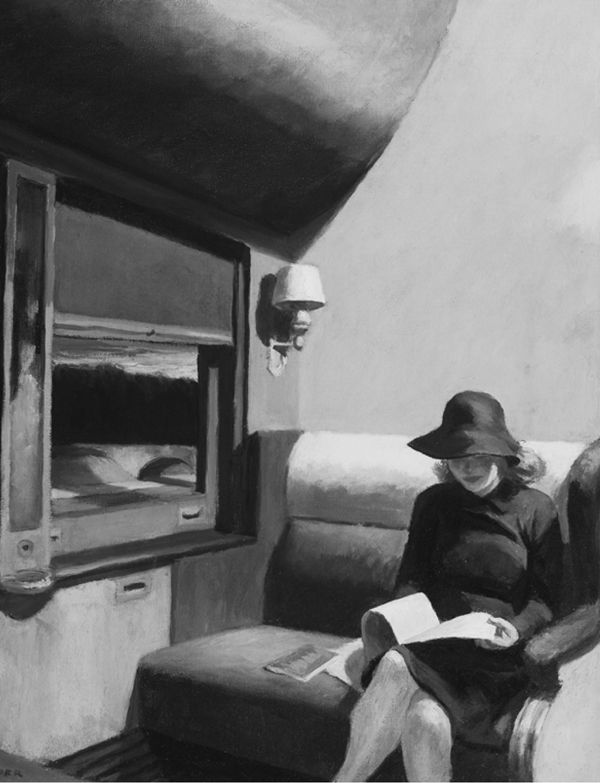旅行的艺术:旅行中的特定场所-7
7
7
霍珀对火车也有兴趣。他很喜欢坐在人很少的车厢里驶过原野的那种感觉:车厢里一片沉寂,只听见车轮有节奏地敲打铁轨的声音;这有节奏的敲击声和窗外飘逝的风景把人带入一种梦幻之中,我们似乎出离了自己的身体而深入一种常态下我们不可能涉及的地带,在那里,各种思绪和诸般记忆错杂纠缠。油画《293号车厢C舱》中的女士正在读着她手中的书,时而打量车舱内的布置,时而观看车窗外的风景,她现在的思绪大概就处于上面所说及的那种梦幻般的状态。
Hopper also took an interest in trains. He was drawn to the atmosphere inside half-empty carriages making their way across a landscape: the silence that reigns inside while the wheels beat in rhythm against the rails outside, the dreaminess fostered by the noise and the view from the windows, a dreaminess in which we seem to stand outside our normal selves and have access to thoughts and memories that may not arise in more settled circumstances. The woman in Compartment C, Car 293 (1938) seems in such a frame of mind, reading her book and shifting her gaze between the carriage and the view.
旅行能催人思索。很少地方比在行进中的飞机、轮船和火车上更容易让人倾听到内心的声音。我们眼前的景观同我们脑子里可能产生的想法之间存在着某种奇妙的关联:宏阔的思考常常需要有壮阔的景观,而新的观点往往也产生于陌生的所在。在流动景观的刺激下,那些原本容易停顿的内心求索可以不断深进。我们倘若被迫去讲出一个笑话或模仿一种口音,效果往往差强人意;同理,如果只是为思考而思考,我们的脑子可能不愿去好好思考。当我们脑子在思索的同时还有别的驱遣,如听音乐或让目光追随一排林木的时候,我们的思考其实是得到了改善。当我们注意到意识已遭遇困境,这种困境又会阻碍各种记忆、渴望、内省或创见的出现,并希望我们的思索程式化、客观化,我们脑子中的那些紧张、挑剔和讲求实际的想法就可能迫使我们中止思考。而这时,我们听到的音乐或看见的风景便正好能够分散我们脑子里紧张、挑剔和讲求实际的想法,让思考继续和深入。
Journeys are the midwives of thought. Few places are more conducive to internal conversations than a moving plane, ship or train. There is an almost quaint correlation between what is in front of our eyes and the thoughts we are able to have in our heads: large thoughts at times requiring large views, new thoughts new places. Introspective reflections which are liable to stall are helped along by the flow of the landscape. The mind may be reluctant to think properly when thinking is all it is supposed to do. The task can be as paralysing as having to tell a joke or mimic an accent on demand. Thinking improves when parts of the mind are given other tasks, are charged with listening to music or following a line of trees. The music or the view distracts for a time that nervous, censorious, practical part of the mind which is inclined to shut down when it notices something difficult emerging in consciousness and which runs scared of memories, longings, introspective or original ideas and prefers instead the administrative and the impersonal.

爱德华·霍珀:《293号车厢C舱》,1938年
在各种交通方式中,火车也许最益于思考:同轮船和飞机比较,坐在火车上,我们决不会担心窗外的风景可能会单调乏味;其速度适中,既不会太慢而让我们失去耐性,也不会太快而让我们无法辨认窗外的景观。在行进过程中,火车能让我们瞥见一些私人空间,譬如说,我们可能刚刚看见一位女士正从厨房的餐台上拿起杯子,紧接着看见一个露台,露台上正睡着一位先生,再接下来,看见公园里一个小孩正在接一只球,至于抛球的人我们却看不见……这些私人空间,虽是短短的一瞥,却给人遐思。
Of all modes of transport, the train is perhaps the best aid to thought: the views have none of the potential monotony of those on a ship or plane, they move fast enough for us not to get exasperated but slowly enough to allow us to identify objects. They offer us brief, inspiring glimpses into private domains, letting us see a woman at the precise moment when she takes a cup from a shelf in her kitchen, then carrying us on to a patio where a man is sleeping and then to a park where a child is catching a ball thrown by a figure we cannot see.
在一次旅行中,火车行进在平坦的原野上,我的思绪差不多完全放松下来。我想到了父亲的死,想到了我正在写作的关于司汤达的论文,还想起了两个朋友间的猜忌。每次只要我的思考遇上死结,脑海一片空白,我就会把目光转移到车窗之外,让视线锁住一个目标,然后跟住它一会儿,直至新的想法开始成形,并能在没有压力的情形下将思绪厘清。
On a journey across flat country, I think with a rare lack of inhibition about the death of my father, about an essay I am writing on Srendhal and about a mistrust that has arisen between two friends. Every time the mind goes blank, having hit on a difficult idea, the flow of my consciousness is assisted by the possibility of looking out of the window, locking on to an object and following it for a few seconds, until a new coil of thought is ready to form and can unravel without pressure.
在长时间的火车梦幻的最后阶段,我们会感觉自己返归本真——亦即开始清楚那些对我们真正重要的情感和观念。我们并非一定得在家里才最有可能接近真实的自我。在家时,家庭装饰会阻挠我们的改变,因为它们并没有改变;家居生活的模式也让我们维持着日常形象,而这形象,可能并非我们的本我形象。
At the end of hours of train-dreaming, we may feel we have been returned to ourselves-that is, brought back into contact with emotions and ideas of importance to us. It is not necessarily at home that we best encounter our true selves. The furniture insists that we cannot change because it does not; the domestic setting keeps us tethered to the person we are in ordinary life, but who may not be who we essentially are.
旅馆的房间同样为我们提供了摆脱定势思维的机会。躺在旅馆的床上,室内极静,偶尔听到酒店内电梯快速上下所发出的声响,此时此刻,我们可以忘却到达之前的一切劳顿,任思绪驰骋,品味自己曾拥有的辉煌和曾遭遇过的落寞。面盆边用纸包着的小肥皂,小吧台上陈列的小瓶包装的酒,承诺整晚提供送餐服务的菜单,以及25楼下平静而又有些骚动的陌生城市的夜景等等,这全然陌生的环境能促使我们从一个新的高度来省察我们的生活。这高度,是我们在家中,为日常琐事所烦扰时所不能达到的。
Hotel rooms offer a similar opportunity to escape our habits of mind. Lying in bed in a hotel, the room quiet except for the occasional swooshing of an elevator in the innards of the building, we can draw a line under what preceded our arrival, we can overfly great and ignored stretches of our experience. We can reflect upon our lives from a height we could not have reached in the midst of everyday business-subtly assisted in this by the unfamiliar world around us: by the small wrapped soaps on the edge of the basin, by the gallery of miniature bottles in the mini-bar, by the room-service menu with its promises of allnight dining and the view on to an unknown city stirring silently twenty-five floors below us.
夜半,旅馆的便条纸成了接受灵光乍现的思想的工具。早餐的菜单(“请在凌晨3点前挂到房门外”)正搁在房间的地上,尚未填写,一起在地上的还有一张问候卡,上面记录着接下来一天的天气情况以及旅馆管理层的晚安祝福。
Hotel notepads can be the recipients of unexpectedly intense, revelatory thoughts, taken down in the early hours while the breakfast menu ('to be hung outside before 3 a.m.') lies unattended on the floor, along with a card announcing the next day's weather and the management's hopes for a peaceful night.
- 频道推荐
- |
- 全站推荐
- 推荐下载
- 网站推荐


















